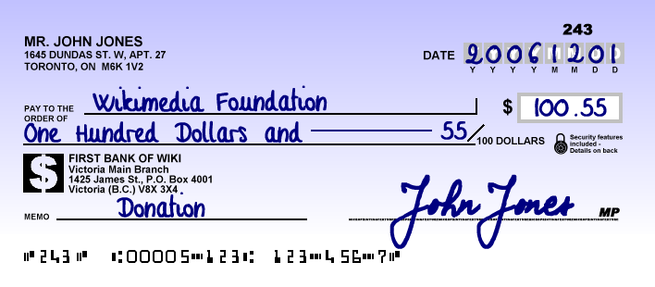Main Difference
The main difference between Cheque and Cash is that the Cheque is a method of payment and Cash is a physical money
-
Cheque
A cheque, or check (American English; see spelling differences), is a document that orders a bank to pay a specific amount of money from a person’s account to the person in whose name the cheque has been issued. The person writing the cheque, known as the drawer, has a transaction banking account (often called a current, cheque, chequing or checking account) where their money is held. The drawer writes the various details including the monetary amount, date, and a payee on the cheque, and signs it, ordering their bank, known as the drawee, to pay that person or company the amount of money stated.
Cheques are a type of bill of exchange and were developed as a way to make payments without the need to carry large amounts of money. Paper money evolved from promissory notes, another form of negotiable instrument similar to cheques in that they were originally a written order to pay the given amount to whoever had it in their possession (the “bearer”).
A cheque is a negotiable instrument instructing a financial institution to pay a specific amount of a specific currency from a specified transactional account held in the drawer’s name with that institution. Both the drawer and payee may be natural persons or legal entities. Cheques are order instruments, and are not in general payable simply to the bearer as bearer instruments are, but must be paid to the payee. In some countries, such as the US, the payee may endorse the cheque, allowing them to specify a third party to whom it should be paid.
Although forms of cheques have been in use since ancient times and at least since the 9th century, it was during the 20th century that cheques became a highly popular non-cash method for making payments and the usage of cheques peaked. By the second half of the 20th century, as cheque processing became automated, billions of cheques were issued annually; these volumes peaked in or around the early 1990s. Since then cheque usage has fallen, being partly replaced by electronic payment systems. In an increasing number of countries cheques have either become a marginal payment system or have been completely phased out.
-
Cash
In economics, cash is money in the physical form of currency, such as banknotes and coins. In bookkeeping and finance, cash is current assets comprising currency or currency equivalents that can be accessed immediately or near-immediately (as in the case of money market accounts). Cash is seen either as a reserve for payments, in case of a structural or incidental negative cash flow or as a way to avoid a downturn on financial markets.
-
Cheque (noun)
A draft directing a bank to pay money to a named person or entity.
“I was not carrying cash, so I wrote a cheque for the amount.”
-
Cash (noun)
Money in the form of notes/bills and coins, as opposed to cheques/checks or electronic transactions.
“After you bounced those checks last time, they want to be paid in cash.”
-
Cash (noun)
Money.
-
Cash (noun)
Cash register.
-
Cash (noun)
A place where money is kept, or where it is deposited and paid out; a money box.
-
Cash (noun)
Any of several low-denomination coins of India, China, or Vietnam, especially the Chinese copper coin.
-
Cash (verb)
To exchange (a check/cheque) for money in the form of notes/bills.
-
Cash (verb)
To obtain a payout from a tournament.
-
Cash (verb)
To disband.
-
Cheque (noun)
an order to a bank to pay a stated sum from the drawer’s account, written on a specially printed form
“they presented him with a cheque for £4,000”
“fees are payable by cheque or postal order”

